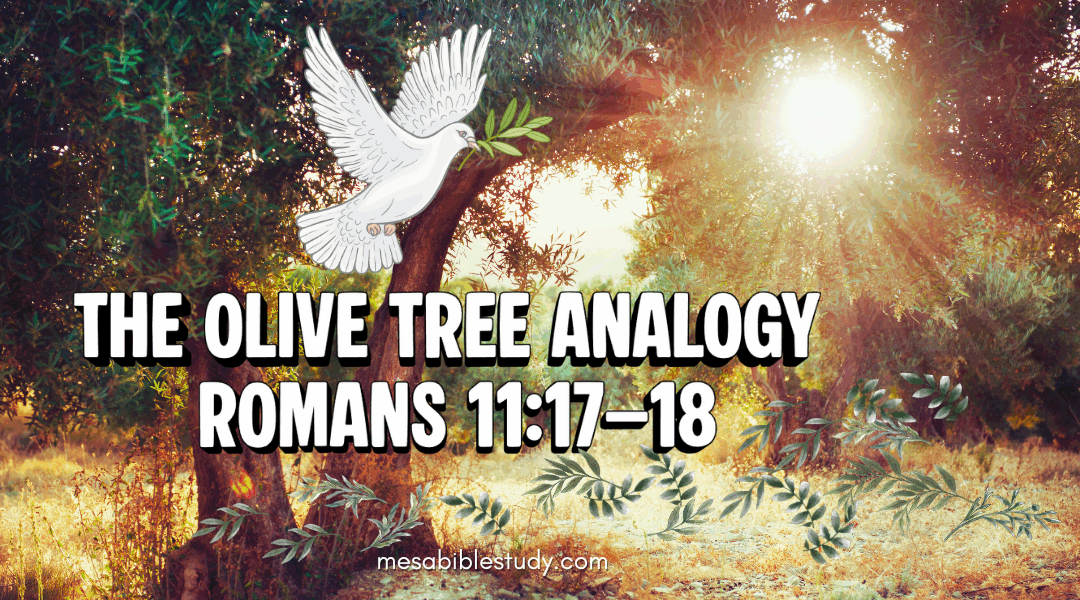
by Jamie Pantastico | Nov 13, 2025 | Israel and Bible Prophecy |
🕊️The olive tree represents continuity—not replacement.
“And if some of the branches were broken off, and you, being a wild olive tree, were grafted in among them, and with them became a partaker of the root and fatness of the olive tree, do not boast against the branches. But if you do boast, remember that you do not support the root, but the root supports you.”
This powerful imagery illustrates the relationship between Israel and the Gentile believers.
- The olive tree represents the covenantal blessings and promises of God.
- The natural branches are Israel.
- The wild branches are believing Gentiles, grafted in by grace.
Gentiles are not replacing Israel but sharing in her spiritual blessings.
We are partakers, not possessors.
Paul warns Gentile believers not to boast. The root (Israel’s covenant with God through Abraham) supports the Church—not the other way around.
This strikes directly at the error of replacement theology, which falsely teaches that the Church has taken Israel’s place.
🕊️The olive tree represents continuity—not replacement.
🕎Israel is the root, the Church is grafted in, and the same God sustains both by grace.
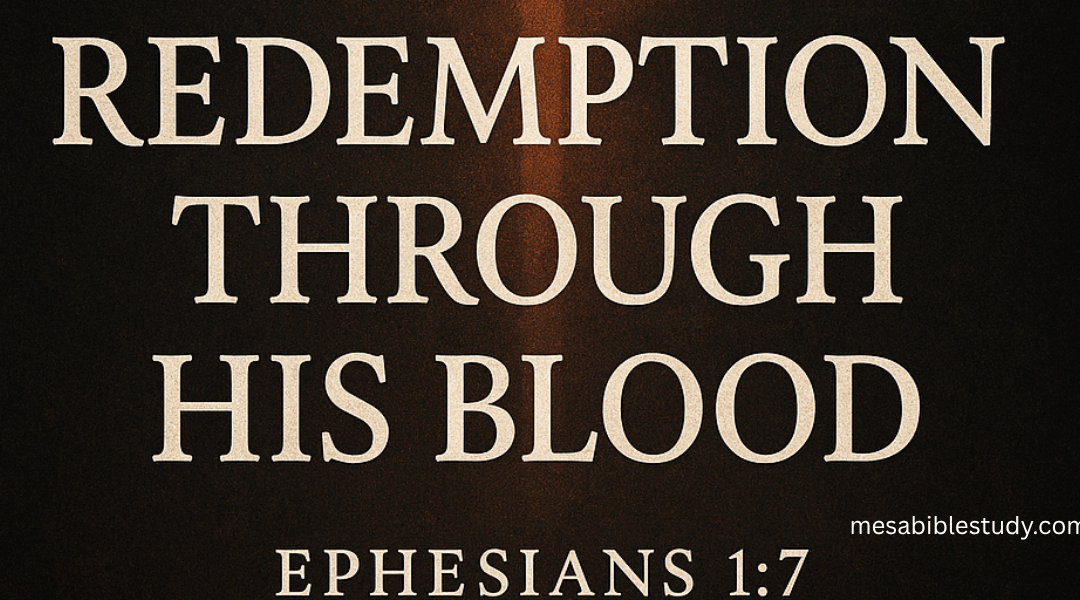
by Jamie Pantastico | Nov 12, 2025 | Pauline Theology |
📖 Passage Breakdown — Ephesians 1:7 — Redemption Through His Blood
📜 Background, Setting & Purpose
✍️ Author:
Paul, the apostle to the Gentiles (Ephesians 3:1–2).
👥 Written To:
The saints at Ephesus and all believers in the Body of Christ (Ephesians 1:1)—Jew and Gentile alike.
⏲️ When:
Around A.D. 60–62, during Paul’s first Roman imprisonment.
🌍 Setting & Purpose:
Paul writes from prison to reveal the believer’s spiritual blessings “in Christ.” This letter emphasizes our heavenly position right now, the mystery of the Church—the Body of Christ—and the riches of God’s grace freely given through the finished work of Christ.
Ephesians 1:7 anchors this entire theme: our redemption, forgiveness, and acceptance before God are found only “in Him.”
🔍 Ephesians 1:7
“In Him we have redemption through His blood, the forgiveness of sins, according to the riches of His grace.”
✨ Phrase-by-Phrase Breakdown
“In Him we have redemption…”
- Our salvation and every spiritual blessing are found in Christ—not in religion, ritual, or law-keeping.
- “Redemption” (Greek: apolutrōsis) means to buy back by paying a ransom. Christ purchased us out of sin’s slave market.
- The verb “have” is present tense—we possess redemption now, not someday.
“…through His blood…”
- The blood of Christ is the divine payment. Without the shedding of blood, there is no remission (Hebrews 9:22).
- His death was not symbolic but substitutionary—the sinless Son of God bore the full penalty of sin.
- Our forgiveness is not earned; it was bought at infinite cost.
“…the forgiveness of sins…”
- Forgiveness (aphesis) means release or freedom from bondage.
- God has removed sin’s penalty and its record forever (Colossians 2:13–14).
- Forgiveness is not based on confession, repentance, or ritual—it is grounded entirely in Christ’s finished work.
“…according to the riches of His grace.”
- Notice: according to, not out of. God doesn’t give from His riches but in proportion to His riches—an inexhaustible measure.
- Every believer stands forgiven and redeemed because of God’s overflowing, boundless grace (Romans 5:20).
❌ What This Passage Does Not Mean
- It does not suggest that redemption requires our works or performance.
- It does not imply partial or temporary forgiveness.
- It does not depend on our ongoing effort to “stay saved.”
✅ What It Does Mean
- Redemption and forgiveness are present realities for every believer.
- Salvation is through Christ’s blood alone, not through human merit.
- God’s grace is immeasurable and inexhaustible, securing the believer forever.
🙏 Devotional Summary
The believer’s entire standing before God rests on one truth: “In Him we have redemption.”
The blood of Christ satisfied the justice of God, erased the record of sin, and made us complete in Him. Nothing needs to be added—no law, no ritual, no human merit.
The riches of God’s grace not only redeem the sinner but sustain the saint.
The same grace that saved us keeps us.
“In Him we have redemption through His blood, the forgiveness of sins, according to the riches of His grace.”
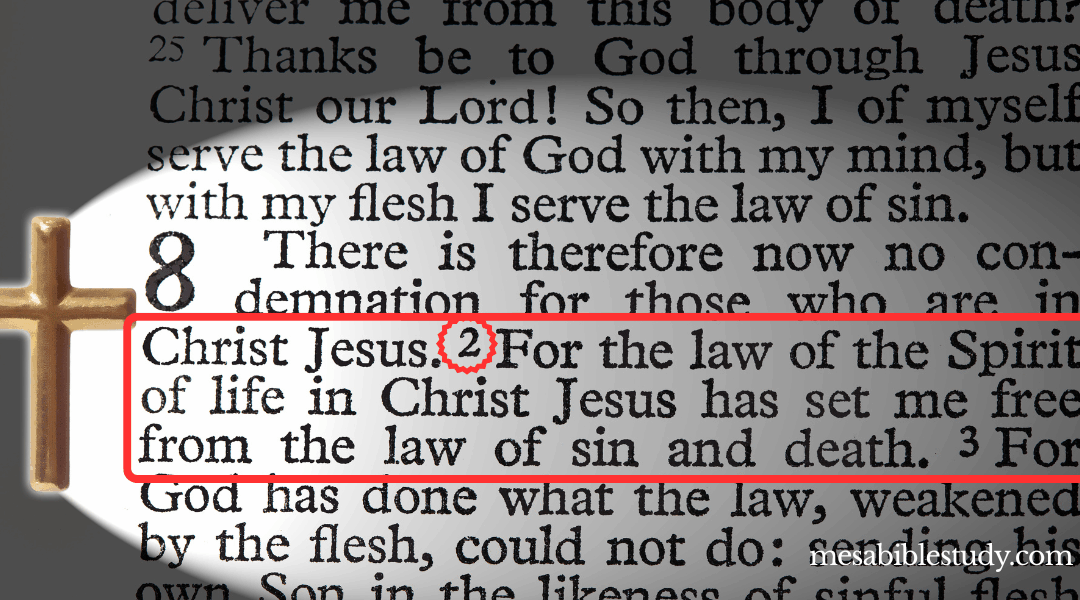
by Jamie Pantastico | Nov 9, 2025 | Verse-by-Verse Bible Studies |
Romans 8:2 – The Law of the Spirit of Life
More Than a Devotional — It’s a Bible Study
The Romans 8 Devotional Series is more than just words to make you feel good or tickle your ears. Each devotional is designed to encourage and edify, guiding you verse by verse through the Apostle Paul’s greatest chapter. Every passage connects to the one before and after—so you can follow the flow of Paul’s Spirit-led reasoning. Using Scripture to explain Scripture, this series reveals the believer’s assurance, victory, and the hope of glory found only in Christ Jesus.
You can get more information about the Romans 8 Series here🔗
Verse Focus:
“For the law of the Spirit of life in Christ Jesus has made me free from the law of sin and death.” Romans 8:2
Context & Connection:
Romans 8:2 explains why there is no condemnation for those in Christ. The verse introduces two contrasting laws: the law of the Spirit of life and the law of sin and death. These “laws” represent governing principles or forces at work.
The “law of sin and death” refers to the power of sin that leads to spiritual death, which Paul discussed in Romans 7:23-25. This law enslaves humanity, bringing guilt, condemnation, and separation from God. But now, those who believe the gospel are “in Christ,” freed from this law by the “law of the Spirit of life.” This speaks of the power of the Holy Spirit, who brings new life, makes us a new creation (2 Corinthians 5:17), and indwells us as the down payment for our future inheritance.
This verse marks a shift in Romans, as Paul begins to emphasize the work of the Holy Spirit. While Romans 7 describes the struggle with sin under the law, Romans 8 reveals the Holy Spirit’s power—a power that grants daily victory over sin.
Devotional Insight:
Freedom in Christ is not just about being saved from condemnation—it is about living in the power of the Holy Spirit. Many believers struggle with sin because they try to fight it in their own strength, forgetting that victory over sin and the law, which gave sin its power, has been crucified with Christ. The power of sin (Old Adam) was the law; Christ Jesus fulfilled the law’s demands and nailed them to His cross.
Sin no longer has dominion over those who are “in Christ.” Yet in our daily experience, we still battle sin because of our fleshly bodies and the fallen world around us. God sees us as forgiven, justified, and righteous in spirit, but while we remain on this earth, we will wrestle with temptation and weakness.
But take heart—the war is won, and the victory is secure. Nothing and no one can separate you from the love of God. The same Spirit who raised Jesus from the dead now dwells in you, empowering you to live a life that pleases God.
When you walk by the Spirit, you experience true freedom—not freedom to sin, but freedom from sin’s control. You are no longer a slave to fear, guilt, or failure. The Spirit empowers you to walk in righteousness, joy, and peace.
Bible Reading Plan:
- Galatians 5:16-25 – Walking in the Spirit vs. walking in the flesh.
- 2 Corinthians 3:17 – Where the Spirit of the Lord is, there is freedom.
- John 8:31-36 – The truth sets us free.
Word of Encouragement:
You don’t have to fight your battles alone—you can’t anyway! The Holy Spirit is your strength, your guide, and your source of life. If you feel bound by sin, fear, or shame, turn to Him. Let the law of the Spirit of life in Christ Jesus set you free today! How? By faith. The Scripture says it—believe it!
Outro Message:
If this devotional was an encouragement to you, please consider sharing it with a friend or loved one who might need it today. Let’s spread the truth of God’s Word together!
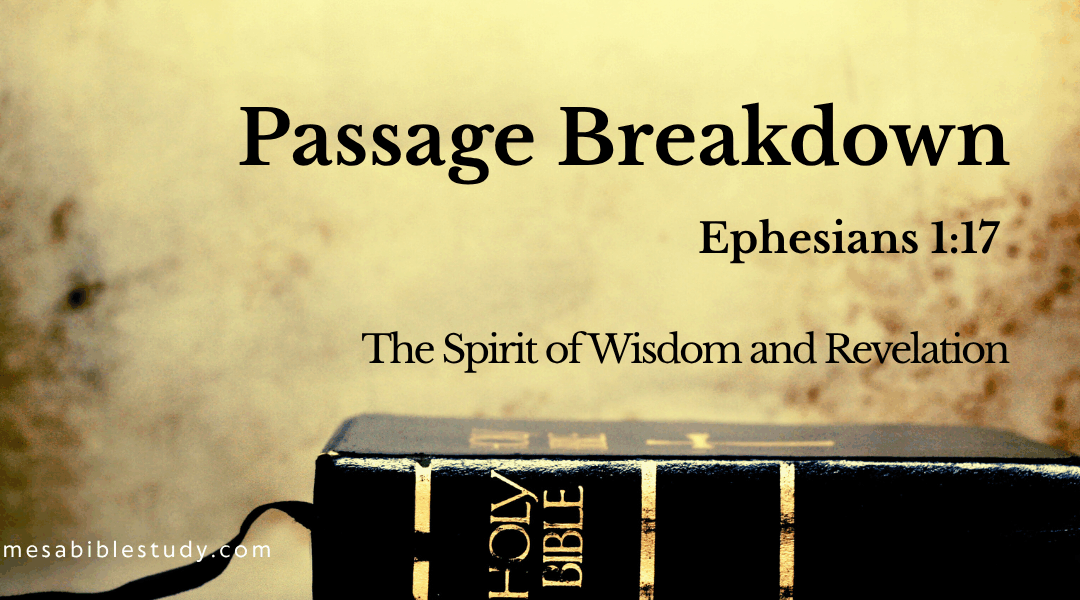
by Jamie Pantastico | Nov 9, 2025 | Verse-by-Verse Bible Studies |
📖 Passage Breakdown — Ephesians 1:17 — The Spirit of Wisdom and Revelation
📜 Background, Setting & Purpose
✍️ Author:
The Apostle Paul, writing under divine inspiration.
👥 Written To:
The saints at Ephesus—and by extension, all members of the Body of Christ (Ephesians 1:1).
⏲️ When:
Around A.D. 60–62, during Paul’s imprisonment in Rome.
🌍 Setting & Purpose:
Paul’s letter to the Ephesians is a revelation of the believer’s heavenly calling and position in Christ. It unveils the mystery of the Church—the Body of Christ—and the spiritual blessings freely given by grace.
In this section (Ephesians 1:15–23), Paul records one of his most profound prayers. He doesn’t pray for material blessings, but for spiritual understanding—that believers might grasp what God has already given them in Christ.
💡 Context & Flow of Paul’s Prayer
When you reach verse 15 and read, “Therefore I also…”, Paul is linking his prayer to everything he wrote in verses 1–14. I was taught long ago that whenever you see a “therefore” in Paul’s letters, always ask, “What is it there for?”
It’s there because of the incredible truths Paul just revealed—truths about the will of God, our position in Christ, redemption through His blood, and the sealing of the Holy Spirit. These doctrines are so profound, so divine, that Paul prays God the Father would give believers a spirit of wisdom and revelation—so that we might truly grasp them.
Paul knew that only the Holy Spirit can enlighten the believer’s heart to understand these spiritual realities. We can read the words, but only the Spirit can reveal their depth. That’s why Paul prays—not for new blessings—but for illumination, that we might know the One who has already blessed us with every spiritual blessing in the heavenly places (Ephesians 1:3).
🔍 Ephesians 1:17
“That the God of our Lord Jesus Christ, the Father of glory, may give to you the spirit of wisdom and revelation in the knowledge of Him.”
✨ Phrase-by-Phrase Breakdown
“That the God of our Lord Jesus Christ…”
- This phrase highlights the distinct relationship within the Godhead: Jesus, in His humanity, fully submitted to the Father’s will.
- Paul’s prayer begins with reverence—recognizing that all revelation and wisdom come from God the Father.
- This title emphasizes Christ’s mediatorial role and His glorified position at the Father’s right hand (Philippians 2:9–11).
“…the Father of glory…”
- God is the source and fountain of all glory—both His own and the glory He shares with believers.
- He is not only glorious but the origin of all glory. This reminds us that every insight or illumination we receive is for His glory, not ours (1 Corinthians 1:31).
“…may give to you the spirit of wisdom and revelation…”
- Paul isn’t asking for new truth to be revealed, but that believers would understand what has already been revealed.
- “Spirit of wisdom” refers to divine insight—the ability to see things as God sees them.
- “Revelation” refers to the unveiling of truth through the ministry of the Holy Spirit (1 Corinthians 2:10–12).
- This is the believer’s continual need: not more information, but illumination by the Spirit.
“…in the knowledge of Him.”
- The Greek word for knowledge (epignōsis) means deep, precise, experiential knowledge.
- Paul’s prayer is not for head knowledge, but heart transformation through knowing Christ personally.
- The more we understand who He is, the more we understand who we are in Him.
❌ What This Passage Does Not Mean
- It does not imply that revelation today equals new doctrine or prophecy.
- It does not suggest that believers lack the Holy Spirit—they already have Him (Ephesians 1:13–14).
- It does not mean we seek mystical experiences, but rather spiritual understanding of God’s Word.
✅ What It Does Mean
- God desires every believer to grow in spiritual understanding and intimacy with Christ.
- The Holy Spirit enlightens the eyes of our heart (v. 18) so we can comprehend God’s grace and calling.
- True knowledge of Christ brings stability, maturity, and worship.
🙏 Devotional Summary
Paul’s prayer should be our daily desire: that we would know Christ—not just know about Him, but know Him intimately.
The same Spirit who inspired Scripture now illuminates it for those who belong to Christ. Our understanding deepens not by striving, but by yielding to the Spirit of wisdom and revelation.
When we begin to see who Christ truly is—the Head of the Body, the fullness of God in human form—it changes everything about how we live, think, and worship.
“That the God of our Lord Jesus Christ, the Father of glory, may give to you the spirit of wisdom and revelation in the knowledge of Him.”
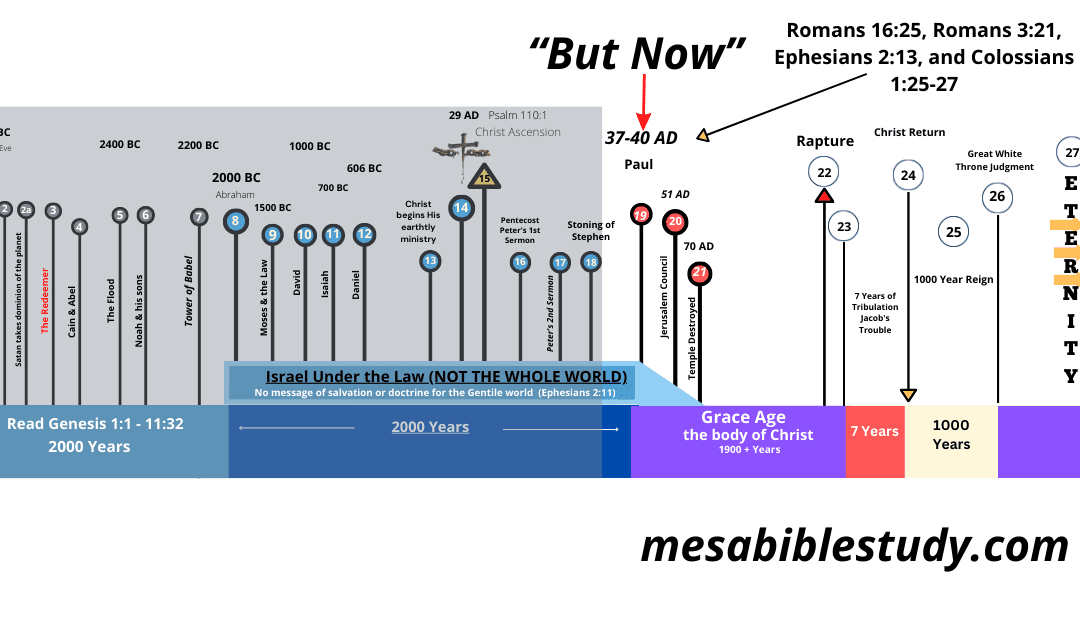
by Jamie Pantastico | Nov 8, 2025 | Israel and Bible Prophecy |
Gospel Sunday: The One True Gospel for Today
Every Sunday we refocus on the gospel—the good news that God the Son, Jesus Christ, died for our sins, was buried, and rose again the third day (1 Corinthians 15:1–4). This Sunday, we take a look at the clear distinctions between the “good news” that Peter proclaimed and the “good news” that Paul proclaimed.
Prayers and blessings to you all, in the precious name of Jesus. 🙏
📍 First, there is only one gospel for salvation today—Paul’s gospel.
Paul preached the good news according to the mystery—a divine secret hidden in the mind of God until it was revealed to him by the ascended and glorified Lord Jesus Christ, years after the cross.
“In the day when God will judge the secrets of men by Jesus Christ, according to my gospel.”
Romans 2:16
It absolutely matters to make the distinction between Peter’s message and Paul’s message.
Why? Because only one has the power unto salvation!
And blending the two (which 95 percent of Christendom does today) perverts Paul’s gospel, nullifying the grace of God.
The distinctions are undeniable if we simply read the text and stop relying on tradition. At the end of his ministry, Peter told his readers—his fellow Jews—that for salvation they needed to turn to Paul’s letters. He didn’t point them back to the Sermon on the Mount or to his preaching at Pentecost. He pointed them to Paul.
Peter recognized that the wisdom given to Paul by the Lord Jesus was now the only message for salvation—the gospel of the grace of God.
Paul Did Not Join Peter and the other Apostles
Paul didn’t continue what Peter started—he was entrusted with a brand-new revelation: the formation of a new body of believers made up of both Jews and Gentiles—the Church, the Body of Christ (Colossians 1:24–27). This “mystery” had been hidden in the mind of God since before time began, but was now revealed through Paul, the apostle to the Gentiles.
Through him, the floodgates of grace opened—offering salvation to all humanity, apart from Israel’s covenants, the Mosaic Law, and temple worship. For two thousand years—from Abraham to Stephen—Gentiles were considered unclean outsiders. God had set Israel apart from the nations because of their idolatry and corruption. But now, through Paul’s gospel, God was reconciling both Jew and Gentile to Himself by grace through faith alone in Christ’s finished work: that He died for our sins, was buried, and rose again the third day.
This message was revolutionary. Israel’s religious leaders viewed Paul as a heretic, and believing Jews from the Jerusalem church undermined his ministry—insisting Gentiles must be circumcised and keep the Law to be saved. Paul stood firm, proclaiming that salvation is by faith alone, not by any work—then or now. His gospel was so radical that the Lord took three years to personally teach and transform Paul, the zealous Pharisee, into the apostle of grace.
For Israel, the thought that their God—the God of Abraham, Isaac, and Jacob—was now offering salvation to pagan Gentiles apart from the Law, apart from the temple, and apart from Judaism was unthinkable. Yet this was God’s eternal purpose now revealed: the glorious mystery of Christ and His Body, the Church.
“Moreover, brethren, I declare to you the gospel which I preached to you, which also you received and in which you stand,
by which also you are saved, if you hold fast that word which I preached to you—unless you believed in vain.
For I delivered to you first of all that which I also received: that Christ died for our sins according to the Scriptures,
and that He was buried, and that He rose again the third day according to the Scriptures.”
1 Corinthians 15:1–4
This one-page guide outlines the key distinctions in Scripture that help us rightly divide (2 Timothy 2:15) between God’s prophetic plan for Israel and the mystery program revealed to Paul for the Church, the Body of Christ.
1. Two Programs in God’s Plan
| Topic |
Prophecy Program (Israel) |
Mystery Program (Church) |
| Main Figure |
🕎 Peter and the 12 apostles |
✝️ Paul, apostle to the Gentiles |
| Audience |
🇮🇱 Nation of Israel (Jews) |
🌍 All nations, Jew and Gentile |
| Gospel |
📜 Gospel of the Kingdom (Matt. 10:5-7) |
💡 Gospel of Grace (1 Cor. 15:1-4) |
| Purpose |
👑 Earthly Kingdom promised to Israel |
🕊️ Heavenly inheritance for the Body of Christ |
| Key Revelation |
🔔 Prophesied “since the world began” (Acts 3:21) |
🔑 Hidden “since the world began” (Rom. 16:25) |
| Law & Ordinances |
📖 Kept and taught (Matt. 5:17-19) |
⚖️ Not under law (Rom. 6:14; Col. 2:14) |
| Baptism |
💧 Water baptism prominent (Acts 2:38) |
🔥 One spiritual baptism (1 Cor. 12:13; Eph. 4:5) |
| Holy Spirit |
🔥 Given at Pentecost (Acts 2) |
🙌 Indwells every believer (1 Cor. 6:19) |
| Focus |
🕍 Nation of Israel, temple worship, prophecy fulfilled |
⛪ The Body of Christ, heavenly position, mystery |
| Timeline |
⏳ Genesis → Acts 7 and Rev. 6–19 |
🕰️ Romans → Philemon (Church Age) |
| Return of Christ |
🌅 Second Coming to Earth to reign as King (Rev. 19) |
👆Rapture of the Church to Heaven (1 Thess. 4:13-18) |
🟦 Blue Column: Represents Israel’s prophetic program.
🟨 Gold Column: Represents the Church’s mystery program.
Together, they reveal the fullness of God’s plan across dispensations.
Summary of the Mystery Revealed to Paul
- Salvation by grace through faith alone, apart from works (Ephesians 2:8–9)
- Jew and Gentile made one new man (Ephesians 3:6)
- The Body of Christ, not Israel (Colossians 1:24–27)
- The Rapture, not the Second Coming (1 Corinthians 15:51–52)
- The temporary blinding of Israel (Romans 11:25)
- Christ in you, the hope of glory (Colossians 1:27)
These truths were never known until God revealed them to Paul (Galatians 1:11–12).
Key Scriptures to Study
Romans 11:13, 16:25
1 Corinthians 15:1–4, 15:51–52
Galatians 1:11–12
Ephesians 2:8–9, 3:1–9
Colossians 1:24–27
1 Thessalonians 4:13–18




